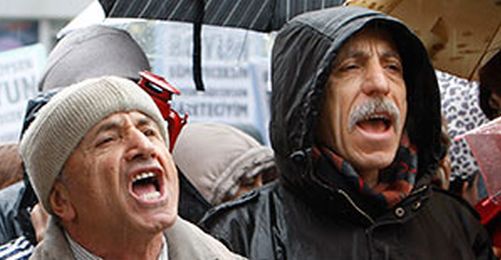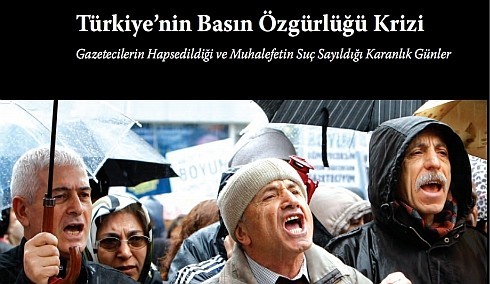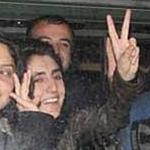CPJ REPORT ON TURKEY
“Orwellian Accusations Levelled Against Journalists in Turkey”


Turkey leads the world in the number of arrested journalists, according to a new report published by the Committee to Protect Journalists (CPJ.)
The report entitled "Turkey's Press Freedom Crisis: The Dark Days of Jailing Journalists and Criminalizing Dissent" highlights the fact that some 76 journalists are currently serving time behind bars in Turkey.
Nina Ognianova, the CPJ's Europe and Central Asia program coordinator, directed the research and served as the report's lead author, while the CPJ's Senior European Advisor Jean-Paul Marthoz, Deputy Director Robert Mahoney, Executive Director Joel Simon, as well as Turkey-based CPJ researchers Özgür Öğret, Şafak Timur and Nebahat Kübra Akalın also contributed to the writing of the report.
Attorney Fikret İlkiz acted as the legal consultant for the report's preparation.
"One of the world's biggest crackdowns on press freedom"
Comprised of five sections, the report elaborates on such issues as the "assault on the press," the trials of crimes against the state, the suits filed against Kurdish journalists, prison letters, the testing of the government's political will and the censuring of the internet.
"The Committee to Protect Journalists prepared this report to highlight the widespread criminal prosecution and jailing of journalists in Turkey, along with the government's use of various forms of pressure to engender self-censorship in the press. CPJ's analysis found highly repressive laws, particularly in the penal code and anti-terror law; a criminal procedure code that greatly favors the state; and a harsh anti-press tone set at the highest levels of government. Turkey's press freedom situation has reached a crisis point," the report said.
In sharp contrast with Turkish officials' claims, the report further indicated that of the 76 journalists in prison in Turkey, at least 61 of them have been jailed in direct connection with their journalistic activities.
"The government of Prime Minister Recep Tayyip Erdoğan has waged one of the world's biggest crackdowns on press freedom in recent history. Authorities have imprisoned journalists on a mass scale on terrorism or anti-state charges, launched thousands of other criminal prosecutions on charges such as denigrating Turkishness or influencing court proceedings, and used pressure tactics to sow self-censorship. Erdoğan has publicly deprecated journalists, urged media outlets to discipline or fire critical staff members, and filed numerous high-profile defamation lawsuits. His government pursued a tax evasion case against the nation's largest media company that was widely seen as politically motivated and that led to the weakening of the company," the report said.
"In the 27 years CPJ has compiled records on journalists in prison, only Turkey itself has rivaled the extent of the current anti-press campaign. In 1996, Turkish authorities jailed as many as 78 journalists, CPJ research shows. Today, Turkey's imprisonments surpass the next most-repressive nations, including Iran, Eritrea, and China," the report added.
"Indictments peppered with Orwellian references"
"The indictments, interviews, and news accounts portray a government intent on imprisoning journalists for publicizing views that the authorities find offensive. Reporting on the PKK, for example, is conflated with aiding the PKK. For these journalists, basic newsgathering activities-receiving tips, assigning stories, relaying information to colleagues-are depicted as engaging in a terrorist enterprise. Conducting interviews with the wrong people-from KCK representatives to the government's own security officials-is used as evidence of a crime... The indictments are peppered with Orwellian guilt-by-association references; one journalist is declared a suspect and then a second journalist is implicated for communicating with the first," said the report.
The CPJ's report also highlighted the case of journalist Tayip Temel:
"The anti-terror law has been used as a club against Kurdish journalists, both historically and with particular frequency in the past two years, CPJ's analysis found. In one case, Tayip Temel, editor-in-chief of Azadiya Welat, the nation's sole Kurdish-language daily, faced 22 years in prison on charges of being a member of the banned KCK. As evidence, the government cited Temel's published work, along with his wiretapped telephone conversations with colleagues and news sources, including members of two Kurdish political parties. "My articles, correspondences, headline discussions, and requests for news and visuals from reporters were defined as 'orders' and 'organizational activity,'" on behalf of a banned group, Temel wrote in a January 2012 letter from prison published by the independent news portal Bianet," the report said.
Over 70 percent of the 76 journalists imprisoned in Turkey are Kurdish journalists, the report also added.
"Media outlets have demoted or sacked prominent columnists and commentators who have angered the prime minister. One journalist, who spoke on condition of anonymity for fear of reprisal, recalled the organization's owner announcing a change of policy to the staff by saying: "Guys, it's finished. I don't want criticism anymore. I don't want to lose my money." The owner gave journalists a simple choice: "If you want to stick with me-do it. If you don't-go,"" the report noted.
The CPJ also stressed the fact that the murderers of Hrant Dink, a Turkish-Armenian journalist assassinated in broad daylight before this office in Istanbul on Jan. 2007, are still out on the loose, while journalist are going to jail by the dozens.
"Halt the use of the anti-terror law against journalists. In numerous cases documented by CPJ, authorities have conflated the expression of political views the government finds offensive with outright terrorism. Such a practice contravenes Article 10 of the European Convention on Human Rights," the CPJ said in its recommendations. (AS)






